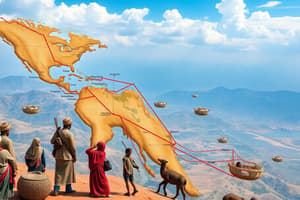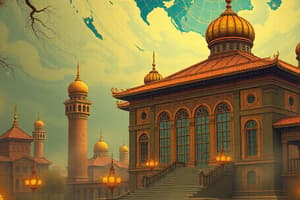Podcast
Questions and Answers
What is a potential negative consequence of globalization regarding employment?
What is a potential negative consequence of globalization regarding employment?
- Relocation of businesses to local areas
- Job losses in developed countries due to automation (correct)
- Increased job security in global markets
- Job creation in developing countries
How can cultural globalization negatively impact cultural diversity?
How can cultural globalization negatively impact cultural diversity?
- Encouragement of cultural exchanges
- Enhancement of local traditions
- Erosion of local cultures due to the dominance of a prevailing culture (correct)
- Promotion of multilingualism
Which aspect of globalization refers to the growth of international bodies governing global issues?
Which aspect of globalization refers to the growth of international bodies governing global issues?
- Technological Globalization
- Political Globalization (correct)
- Economic Globalization
- Cultural Globalization
What is the impact of globalization on income inequality?
What is the impact of globalization on income inequality?
Which statement best describes the relationship between technological and economic globalization?
Which statement best describes the relationship between technological and economic globalization?
What is one of the social issues that can arise from globalization?
What is one of the social issues that can arise from globalization?
What contributes to environmental degradation as a result of globalization?
What contributes to environmental degradation as a result of globalization?
What is a potential effect of cultural globalization on national sovereignty?
What is a potential effect of cultural globalization on national sovereignty?
What was one of the primary effects of the Age of Exploration on globalization?
What was one of the primary effects of the Age of Exploration on globalization?
Which event during the Modern Era disrupted globalization?
Which event during the Modern Era disrupted globalization?
In which era did the establishment of international financial institutions like the IMF occur?
In which era did the establishment of international financial institutions like the IMF occur?
What characterized globalization 3.0 as defined by Thomas Friedman?
What characterized globalization 3.0 as defined by Thomas Friedman?
Which type of globalization involves the movement of capital across countries?
Which type of globalization involves the movement of capital across countries?
Which of the following challenges is associated with continued globalization in the 21st century?
Which of the following challenges is associated with continued globalization in the 21st century?
What facilitated global connectivity during the late 20th century?
What facilitated global connectivity during the late 20th century?
What role did free trade agreements play in the 19th century regarding globalization?
What role did free trade agreements play in the 19th century regarding globalization?
Flashcards are hidden until you start studying
Study Notes
Pre-Modern Era (Before 1500)
- Ancient civilizations connected through trade routes like the Silk Road and Spice Route, facilitating cultural and economic exchange.
- European explorers like Columbus and Magellan expanded global connections by seeking new lands, trade routes, and resources.
Early Modern Era (1500-1800)
- European colonialism led to the exchange of goods, people, and ideas across continents.
- The Industrial Revolution fueled globalization with advancements in transportation and communication, facilitating global trade and cultural exchange.
Modern Era (1800 - Present)
- The 19th century saw economic globalization promoted through the Gold Standard and free trade agreements.
- World Wars disrupted globalization but led to recovery afterward.
- Post-War Era:
- The Bretton Woods System established international institutions like the IMF and World Bank to stabilize the global economy.
- Decolonization increased global interconnectedness with the formation of new nations.
Late 20th Century
- Neoliberal economic policies accelerated globalization by emphasizing free markets and deregulation.
- The Technological Revolution enhanced global connectivity with advancements in communication and information technology (e.g., the internet).
- Globalization 3.0 (Thomas Friedman): This era signifies individual globalization, where individuals and small businesses participate in the global economy.
21st Century
- Continued Globalization:
- Complex global supply chains connect production and distribution networks across countries.
- Increased cross-cultural interaction through travel, communication, and media.
- Challenges:
- Economic inequality, environmental concerns, and cultural homogenization arise as consequences of globalization.
Types of Globalization
- Economic Globalization:
- Facilitates the free flow of goods, services, investment capital, labor, and technology across borders.
- Cultural Globalization:
- Disseminates information and ideas through global media outlets.
- Promotes the adoption of global languages, values, and cultural exchanges through tourism.
- Political Globalization:
- Characterized by the growth of international organizations like the United Nations and the European Union.
- Encourages global governance through rules, regulations, democratic principles, and diplomatic negotiations.
- Technological Globalization:
- Driven by advancements in communication technologies (internet, smartphones), transportation systems, and information accessibility.
- Social Globalization:
- Marked by the formation of global social networks and communities, the development of global consciousness, and the growing global inequality.
Issues in Globalization
- Economic Issues:
- Income inequality between developed and developing countries.
- Potential job losses in developed countries due to automation and outsourcing.
- Exploitation of labor in developing countries with low wages and poor working conditions.
- Environmental degradation through increased pollution and resource depletion.
- Social Issues:
- Cultural homogenization as dominant cultures become more prevalent.
- Loss of national sovereignty for countries increasingly integrated into the global economy.
- Social unrest and protest due to economic inequality and job losses.
Studying That Suits You
Use AI to generate personalized quizzes and flashcards to suit your learning preferences.




